Pass the SHL Mechanical Comprehension Test 2025: Free Practice Exam & Prep Material
- Overview
- Quiz
- Curriculum
- Reviews
The SHL Mechanical Comprehension Test is an essential assessment used by employers to estimate a candidate’s knowledge and skills in mechanical concepts. This test is crucial for individuals aspiring to secure technical positions in manufacturing companies and engineering firms. A strong performance in the SHL Mechanical Comprehension Test not only demonstrates a candidate’s competency in mechanical concepts but also their understanding of problem-solving abilities and proficiency in working with high-end machinery.
Overall, the test is a valuable indicator of a candidate’s expertise and suitability for roles requiring mechanical knowledge and skills.
Understanding the SHL Mechanical Comprehension Test
The SHL Mechanical Comprehension Test aims to evaluate candidates’ understanding of mechanical comprehension principles, enabling employers to assess their knowledge, problem-solving abilities, and proficiency in working with machinery and tools.
The test consists of 20 questions, each presenting an image of a mechanical tool. For each question, you need to select an answer from the four multiple-choice options provided. The test duration is limited to 15 minutes, which adds an element of challenge to the task of answering all the questions within the given time frame. This thoughtfully constructed framework is an excellent platform to evaluate and affirm your mechanical expertise.
The test is scored solely based on the number of correct answers. Employers typically use percentile ranking to evaluate candidates, comparing their scores with a group of test-takers. It is important to aim for the highest percentile to maximize your chances of selection in the mechanical comprehension test. Keep in mind that there is a strict time constraint, and once you submit your answers, you cannot revisit the questions. Therefore, it is crucial to answer thoughtfully and carefully.

Rapid SHL Masterclass
Last Updated: Jan 31, 2025
Course Content
- 1Intro and Strategy2 steps - 10 minutesBuy this Course: Get full access to all lessons, practice tests and guides.
- 2SHL Numerical Reasoning Test7 steps - 2 hoursBuy this Course: Get full access to all lessons, practice tests and guides.
- SHL Numerical Reasoning
- Numerical Reasoning Strategies
- Basic Arithmetic Operations - Written Guide
- Decimals, Fractions & Conversions - Written Guide
- Percentages, Ratios & Proportions - Written Guide
- SHL Numerical Reasoning Practice Quiz – 1
- SHL Numerical Reasoning Practice Quiz – 2
- SHL Numerical Reasoning Practice Quiz – 3
- SHL Numerical Reasoning Practice Quiz – 4
- 3SHL Numerical Calculation Test2 Steps, 40 MinutesBuy this Course: Get full access to all lessons, practice tests and guides.
- 4SHL Inductive Reasoning Test2 steps - 50 minutesBuy this Course: Get full access to all lessons, practice tests and guides.
- 5SHL Deductive Reasoning Test2 Steps, 40 MinutesBuy this Course: Get full access to all lessons, practice tests and guides.
- 6SHL General Ability (Verify G+) Test3 Steps, 1 HourBuy this Course: Get full access to all lessons, practice tests and guides.
- 7SHL Verbal Reasoning Test1 steps - 20 minutesBuy this Course: Get full access to all lessons, practice tests and guides.
- 8SHL Spatial Reasoning Test2 steps - 25 minutesBuy this Course: Get full access to all lessons, practice tests and guides.
- 9SHL Mechanical Comprehension Test10 steps - 1 hour 30 minutesBuy this Course: Get full access to all lessons, practice tests and guides.
- SHL Mechanical Comprehension Test
- Gears - Written Guide
- Force & Torque - Written Guide
- Tools & Equipments - Written Guide
- Fluid Mechanics - Written Guide
- Wheels and Belts - Written Guide
- PRESSURE - Written Guide
- MAGNETISM - Written Guide
- Gears - Video Guide
- Wheels & Belts - Video Guide
- SHL Gears Practice Questions
- SHL Wheels & Belts Practice Questions
- SHL Pressure Practice Questions
- SHL Magnetism Practice Questions
- SHL – Mechanical Comprehension Practice Questions
- 10SHL Personality Test1 steps - 40 minutesBuy this Course: Get full access to all lessons, practice tests and guides.
- 11SHL Situational Judgement TestBuy this Course: Get full access to all lessons, practice tests and guides.
- 12SHL Verify Interactive Tests4 steps, 1hourBuy this Course: Get full access to all lessons, practice tests and guides.
- 13SHL Full Practice Test3 steps - 1 hourBuy this Course: Get full access to all lessons, practice tests and guides.
- 14SHL Checking Tests6 steps - 40 minutesBuy this Course: Get full access to all lessons, practice tests and guides.
- 15BONUS Interview Prep Video Guide1 steps -10minutesBuy this Course: Get full access to all lessons, practice tests and guides.
Free SHL Mechanical Comprehension Practice Test
Success Stories 4.4 882 Reviews





rob, 16 Jan
Solid review course that covers the…
Solid review course that covers the relevant topics in good detail





chad, 11 Jan
Great Program, amazing practice simulations
Easy to understand. Passed tests on first time thru.





QUEEN RIGHTEOUS, 07 Jan
Highly recommended.Great instructional…
Highly recommended.Great instructional information. I passed on the first try.





Rehan Ali, 06 Jan
The SHL Assessment was very helpful
The SHL Assessment was very helpful. The layout was great and everything was explained good. I passed the test and secured the job. My wife got me this course thanks to her and prepterminal 🙂





Mario Pacini, 21 Dec
I did the SHL Assessment prep and…
I did the SHL Assessment prep and managed to get comfortable with the test in less than 24hrs. Highly recommend this test.





Annonymous, 18 Dec
Course helped me pass SHL exam
Course helped me pass SHL exam. Highly recomended.
SHL Mechanical Comprehension Question Types
This Mechanical comprehension Test covers five essential topics in the field of mechanical engineering: Gears, Force and Torque, Fluid Mechanics, Tools, and Equipment. Each topic represents a fundamental aspect of mechanical comprehension principles that candidates are expected to comprehend and apply. Let’s look at these topics in detail and sample questions you can expect
Gears
Gears are essential elements in mechanical systems, responsible for power transmission and control of speed and torque. In the SHL Mechanical Comprehension Test, the topic of gears focuses on understanding the principles of gear systems, including gear types, ratios, and their applications in mechanical engineering. It is important to be familiar with gear terminology, gear engagement, and gear trains. Additionally, practical knowledge of gear applications in different industries, such as speed reduction, torque amplification, direction change, and synchronization, is crucial.
Sample Question
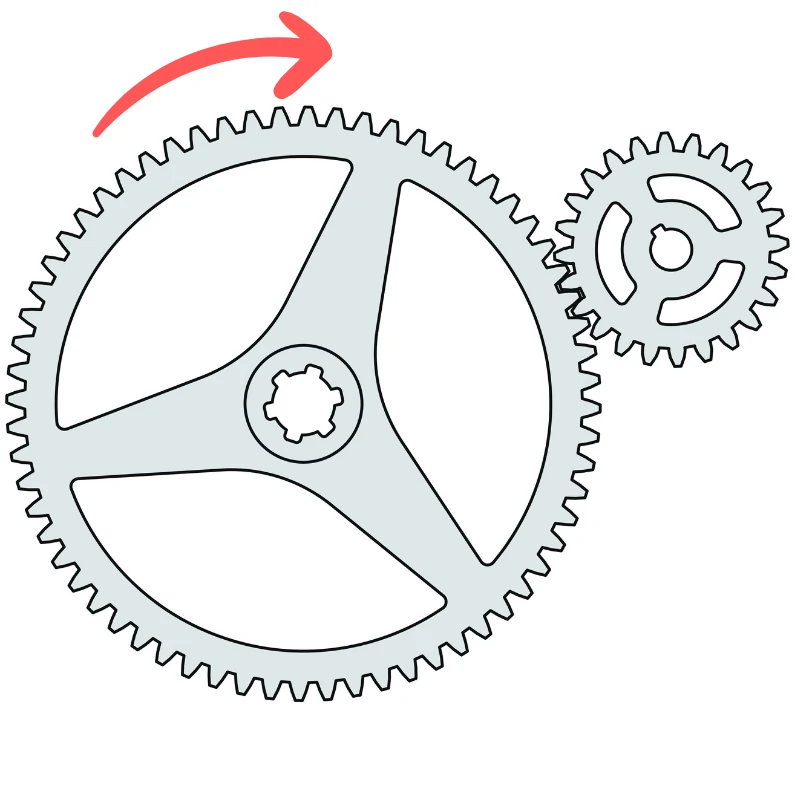
- A:
80 revolutions
- B:
90 revolutions
- C:
100 revolutions
- D:
120 revolutions
Explanation:
The number of revolutions a gear makes is inversely proportional to the number of its teeth. This is because the larger gear with more teeth will move a smaller gear with fewer teeth more times. Therefore, in a gear system, if the larger gear (with 64 teeth) makes 30 revolutions, the smaller gear (with 24 teeth) will make (64/24)*30 = 80 revolutions.
Force & Torque
This topic explores the concepts of forces and torques in mechanical systems. You should have a solid understanding of calculating forces, interpreting torque, and analyzing their effects on mechanical components and systems. Key areas to focus on include:
Force Analysis: You need to be proficient in analyzing the forces acting on mechanical components, considering factors such as magnitude, direction, and point of application. This includes understanding the principles of static equilibrium and dynamic forces in relation to mechanical systems.
Torque Analysis: Mastery of torque analysis and calculations is essential, including understanding the relationship between force, distance from the axis of rotation, and the resulting torque. You should be able to calculate torques accurately using relevant equations.
Effects of Forces and Torques: You should know how force and torque affect the behavior of mechanical systems and tools. This includes knowledge of concepts such as rotational motion, angular acceleration, and the resulting effects on speed, stability, energy transfer within the system, etc.
Sample Question
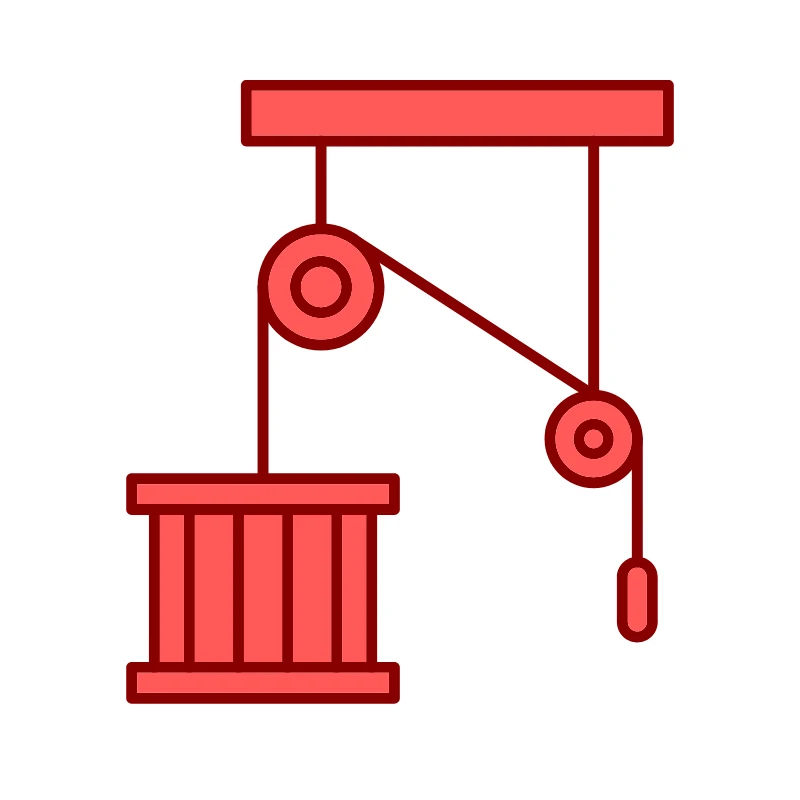
- A:
More force.
- B:
Less force.
- C:
The same amount of force.
- D:
Not enough information to determine.
Explanation: A pulley system reduces the amount of force required to lift an object by spreading the force over multiple lengths of rope. Therefore, the user will require less force to lift the box using the pulley system compared to lifting it directly.
Fluid Mechanics
The Fluid Mechanics section of the SHL Mechanical Comprehension Test emphasizes the principles and behavior of both liquids and gases. It is essential to have a deep understanding of crucial fluid properties such as density, viscosity, and pressure, as well as the ability to calculate pressures accurately. Practical application of fluid mechanics principles, including working with hydraulic systems, pumps, pipes, and fluid flow control devices, is necessary to successfully tackle the questions in this category.
Sample Question
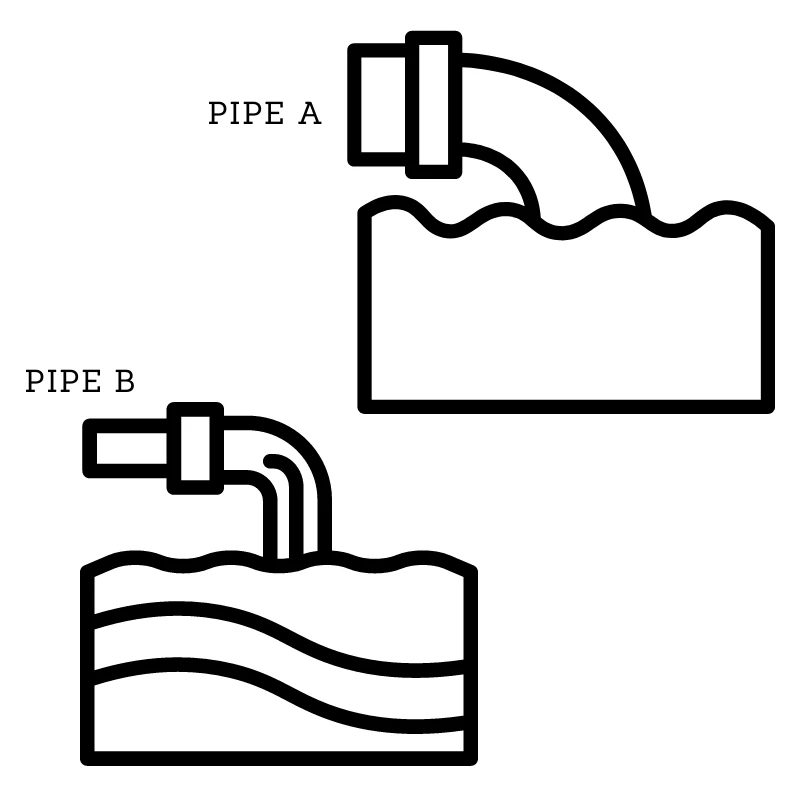
- A:
Pipe A
- B:
Pipe B
- C:
Both will have the same fluid speed.
- D:
There is not enough information to determine.
Explanation: According to the principle of continuity, which is derived from the conservation of mass, the speed of a fluid (in this case, water) increases as it moves through a pipe with a smaller cross-sectional area. Therefore, the water will move faster through Pipe B, which has a smaller diameter than Pipe A.
Tools
This section evaluates your knowledge and expertise in mechanical tools commonly used in engineering and manufacturing industries. It reckons your familiarity with tool functions, proper usage, and safety protocols. Questions may present visual representations of tools, requiring candidates to identify their names, purposes, or appropriate applications.
Sample Question

- A:
Easier
- B:
Harder
- C:
The difficulty remains the same
- D:
Not enough information to determine
Explanation: The crowbar acts as a lever, and the force exerted by a lever is inversely proportional to the distance from the fulcrum to where the force is applied. So, by placing the fulcrum closer to the crate, the man will have to apply less force to open the crate.
Equipment
The Equipment category assesses candidates’ level of familiarity with various mechanical equipment typically found in industrial environments. Questions in this section cover a wide range of topics, including machine operation, adherence to safety protocols, and equipment maintenance. Candidates are expected to demonstrate their knowledge and understanding of operating procedures, safety measures, and best practices related to mechanical equipment commonly encountered in industrial settings.
Sample Question
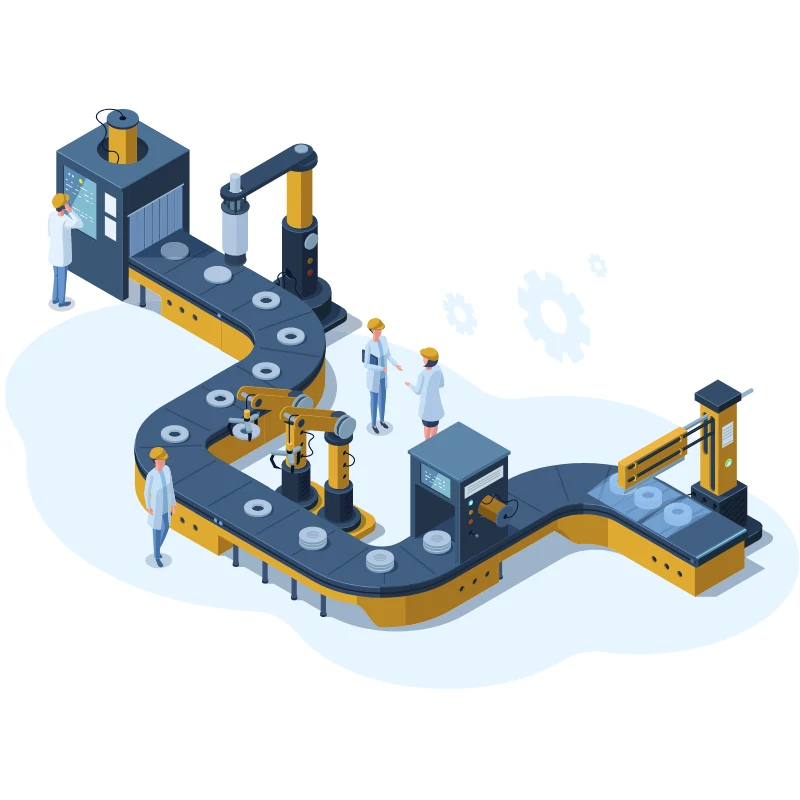
- A:
Attempt to manually move the robot arm.
- B:
Restart the control system to clear the error.
- C:
Report the issue and follow procedures.
- D:
Try to resolve the error themselves
Explanation:
Standard operating procedures in industrial settings typically involve reporting any malfunctions or errors immediately to a supervisor or a responsible team. Attempting to resolve issues without proper procedure can potentially result in additional damage or safety risks.
Skills Required for Passing the SHL Mechanical Comprehension Test
A strong foundation in mechanical principles, the ability to solve problems, technical aptitude, attention to detail, effective time management, critical thinking, and familiarity with safety protocols are crucial for achieving a high score in the test. By developing and mastering these skills you can increase your chances of success.
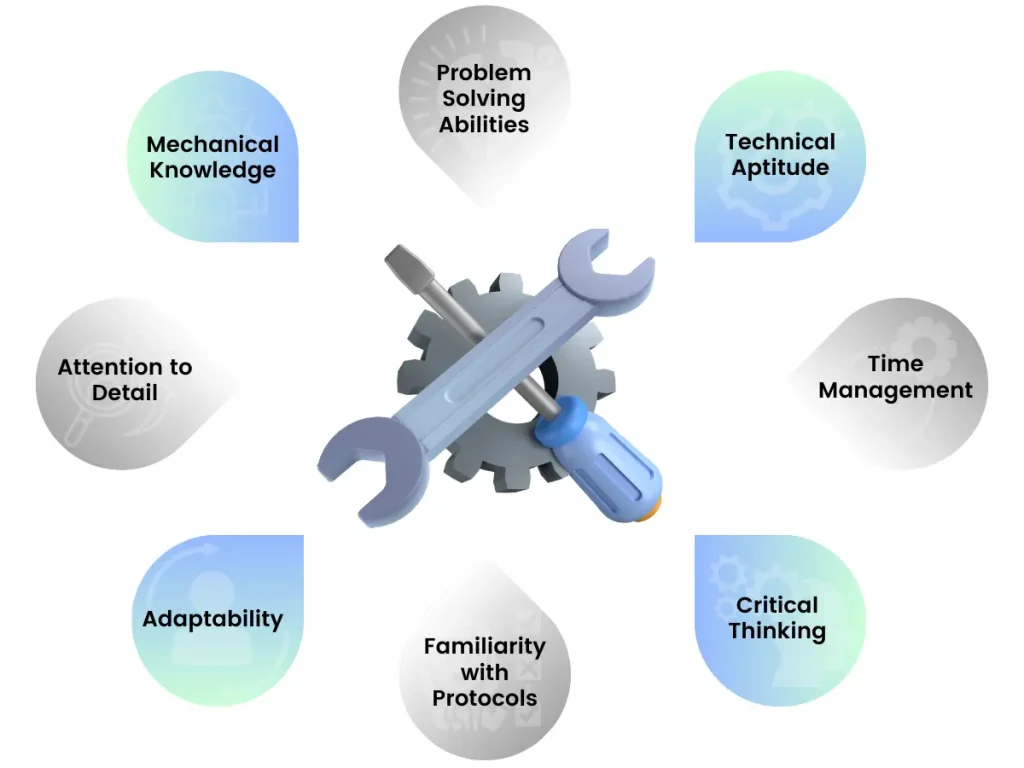
How Our Prep Course Can Help
Our SHL Prep Course is specifically designed to cater to your needs for the Mechanical Comprehension Test. We understand the importance of this topic, which is why we have developed an in-depth lesson dedicated solely to Mechanical comprehension. This lesson covers all the essential concepts, principles, and calculations related to Mechanical comprehension.
In addition to the detailed lesson, our course offers two dedicated practice tests focusing specifically on Mechanical comprehension. These practice tests are designed to simulate the actual test experience and provide you with ample opportunities to apply your knowledge, practice your skills, and familiarize yourself with the types of questions you may encounter in the test.
By enrolling in our SHL Prep Course, you will have access to a comprehensive range of resources and materials to support your preparation for the Mechanical Comprehension Test and other SHL test modules. Our complete SHL prep package is designed to cater to various cognitive ability tests, ensuring that you are fully prepared for the specific test modules required by your prospective employers.

Created by: Michael Lerner
BSc, Psychometric Tutor, Prepterminal Test Expert
5840 students, 4.4, 882 Reviews
Hey, welcome to our Rapid SHL Masterclass. I’m Michael, PrepTerminal’s SHL Rapid SHL Masterclass in-house expert. I am here to assist you with any queries about the Rapid SHL Masterclass. Don’t hesitate to contact me at [email protected].
